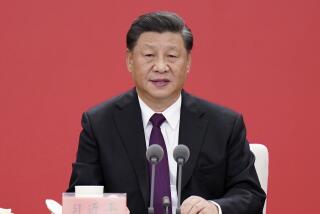Experiment With Liberalization Suddenly Ends : China Tells Press It Must Follow the Party Line
- Share via
PEKING — During the last few years, the Chinese press has been cautiously experimenting with Western-style journalism.
A few muckraking reporters have published accounts of corruption by entrenched local party officials, and official press groups have issued public calls for the adoption of new laws protecting the rights of the media.
But now, Communist Party authorities have issued a stern warning that the Chinese press will not be allowed to exercise the sort of freedom permitted in capitalist countries. Instead, the regime said, newspapers in China must continue to reflect the views of the party.
Party’s Principles
“Journalism speaks on behalf of the party and government and makes comments and direct work in accordance with the party’s lines, principles and policies,” declared Hu Yaobang, the party’s general secretary. The purpose of journalism, he said, “is to arouse the people to work with one heart and one mind for the realization of the party’s objectives.”
Hu, the protege of Chinese leader Deng Xiaoping and head of China’s 40-million member Communist Party, even proposed a numerical ratio of good news to bad in the Chinese press. He suggested that 80% of the space in a newspaper be devoted to “achievements, bright aspects and things good” and that the other 20% cover “shortcomings, dark aspects and criticisms.”
Hu’s remarks were contained in a lengthy speech on the role of journalism made last February to a group of Communist Party leaders. China’s leading newspapers did not publish accounts of the speech until April 14.
One Western diplomat here said he views Hu’s speech as the latest in a series of indications that the Chinese regime intends to tighten political control as it carries out its program of economic reforms. “It’s another signal that even if they open up on the economic front, they’re still good orthodox Leninists,” he said.
Percentage Reporting
However, another Western analyst said he found some room for hope for Chinese newspapers in the acknowledgment by the Communist Party leader that 20% of their space could be devoted to the darker sides of life in China.
Hu delivered his speech a few weeks after a writers’ conference in which Communist Party officials promised the country’s leading literary figures a greater degree of creative freedom. One of the main points of his speech was that the party will not allow the same sort of freedom for journalism as it does for art and literature.
“The slogan ‘freedom of creation’ for literature and art does not entirely apply to journalism,” Hu explained, “because journalism speaks on behalf of the party and government, while artists represent themselves and use what they observe to encourage and educate the people.”
The Communist Party chief also rejected the contention that the regime’s economic liberalization should lead to greater freedom of the press.
New Freedom for Managers
Under the economic reform program announced last October, China is giving greater independence to managers of factories and other enterprises. Communist Party officials are being told to avoid getting involved in the daily operations of these organizations.
But Hu said China’s news organizations cannot be considered “independent producers” in the way that a factory can. “No matter how many reforms are carried out, the nature of the party’s journalism cannot be changed,” he said.
While Chinese journalists can learn the advanced technology and management methods used by the press in capitalist countries, he said, “the fundamental principle of bourgeois journalism cannot be learned, because the social systems are different.”
Hu spoke critically of the Western press, expressing the conventional Marxist view that newspapers in capitalist countries reflect the views of entrenched financial interests.
He said some Chinese journalists have the “unrealistic view” that reporting in Western countries is more truthful and accurate than that in Chinese newspapers. But then, as what he called proof that the Western press is not always accurate, he pointed to foreign press accounts of factional struggles within the Chinese leadership between conservatives and pragmatists. The truth, he said, is that “there is unprecedented stability in our government.”
Signs of Encouragement
A few months ago, China’s top leaders appeared to be encouraging a greater assertiveness on the part of the Chinese press--apparently in the hope that reporters might help ferret out local party officials who are resisting the regime’s economic reform program.
The monthly magazine Democracy and Legal System last fall published a letter from a reporter who called for new laws protecting the rights of the news media “to criticize and to expose the evils existing in our society.”
But Hu made clear that China will impose strict limits on such reporting. “China has both its bright side and dark side,” declared the Communist Party leader. “But the bright side is the principal aspect, while the dark side is only secondary.”
More to Read
Sign up for Essential California
The most important California stories and recommendations in your inbox every morning.
You may occasionally receive promotional content from the Los Angeles Times.













